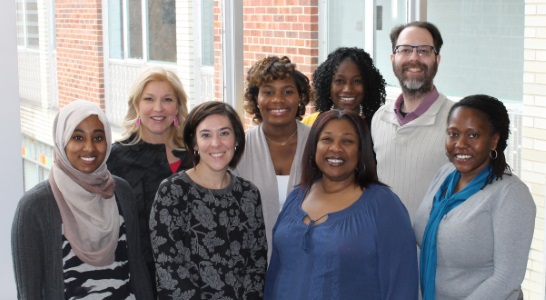Social Work's Entrepreneurship Committee wins national award for innovative teaching

The Entrepreneurship Committee of the Wayne State School of Social Work has won the 2018 Award for Innovative Teaching in Social Work, an honor bestowed by SAGE Publishing and the Council on Social Work Education. Established in 2017, the committee has distinguished itself within social work higher education by creating meaningful opportunities for social work students to explore the emerging field of social entrepreneurship through coursework, campus-based interdisciplinary collaborations, academic advising, and access to Greater Detroit professionals.
Social entrepreneurs seek to change a persistent and unequal status quo through disruptive social innovation, often by leveraging financial, human, physical, social and political capital to create additional value. The social work profession - and by extension social work educators - have been slow to embrace social entrepreneurship despite its fit with the discipline's core values and the emergence of social enterprise models using business and entrepreneurship concepts, theories and practices to solve problems of importance to social workers.
"Historically, entrepreneurship in social work has been primarily conceptualized as - and limited to - social work clinicians starting a private practice or consultancy," explained Marijo Upshaw, adjunct faculty at Social Work and the Mike Ilitch School of Business and a committee cofounder. "However, millennial social workers have entrepreneurial intentions that defy that limited paradigm. They want to join the growing social entrepreneurship ecosystem - particularly in urban centers like Detroit that have tremendous social justice challenges - and they are seeking content in and out of the classroom that will teach them how these enterprises operate."
That includes navigating the myriad operating, planning, marketing, financing and governing issues related to starting a venture or spearheading social change efforts outside of traditional government and nonprofit sectors, most notably commercial entrepreneurship, hybrid, or alternative structures such as L3Cs, benefit corporations and cooperatives. To provide this content, Social Work's Entrepreneurship Committee created an elective introductory course on social entrepreneurship open to students across academic disciplines. Taught by Upshaw, the course guides students in the creation of a social change venture and links them to community-based social enterprise incubators and accelerators.
The committee has also collaborated with OptimizeWayne, an interdisciplinary student-led organization that promotes social innovation across academic interests, and in April hosted the first-ever social entrepreneurship conference on campus, drawing nearly 200 students, faculty, staff and community professionals for presentations and networking. It is also working with social work advisors to identify early social work students with entrepreneurial aspirations and linking them to academic and professional resources, including a certificate in Entrepreneurship and Innovation from the university's business school.
"During my advising sessions, many students share with me their desire to not just be a part of the change, but to actually create it," said academic advisor Tamarie Willis, who serves on the committee. "Having a social entrepreneurship focus here at the School of Social Work allows our students to now see this as a possibility. The course goes a long way to making it more practical and tangible."
According to Upshaw, social work students are calling the new entrepreneurship content "game changing." Students in her social work course have explored the feasibility of starting social enterprise ventures to address the high rate of unemployment among LGBTQ youth of color, to advance holistic care through greater access to medical marijuana, and to provide affordable housing for persons with physical disabilities and their caregivers. Through OptimizeWayne's Social Innovation Challenge, two M.S.W. students won a combined $8,000 to establish Rights For Refugees and Detroit 3E, which respectively provide services for forcibly displaced people and address the education attainment gap for students of color.
Associate Social Work Professor Richard Smith, academic advisor and committee co-chair Shantalea Johns, Optimize Wayne co-founder Limi Sharif, Director of Philanthropy Jana McNair, alumna Charise Coats and M.S.W. student Dominique Golden collaborate with Upshaw and Johns as members of the Entrepreneurship Committee. Initiatives of the committee will be featured in a workshop on social entrepreneurship's applications to social justice at CSWE's 2018 Annual Program Meeting in Orlando.
"Our work fits nicely into not only the school's strategic plan, but also the university's strategic plan to promote entrepreneurship in Detroit," Smith said.